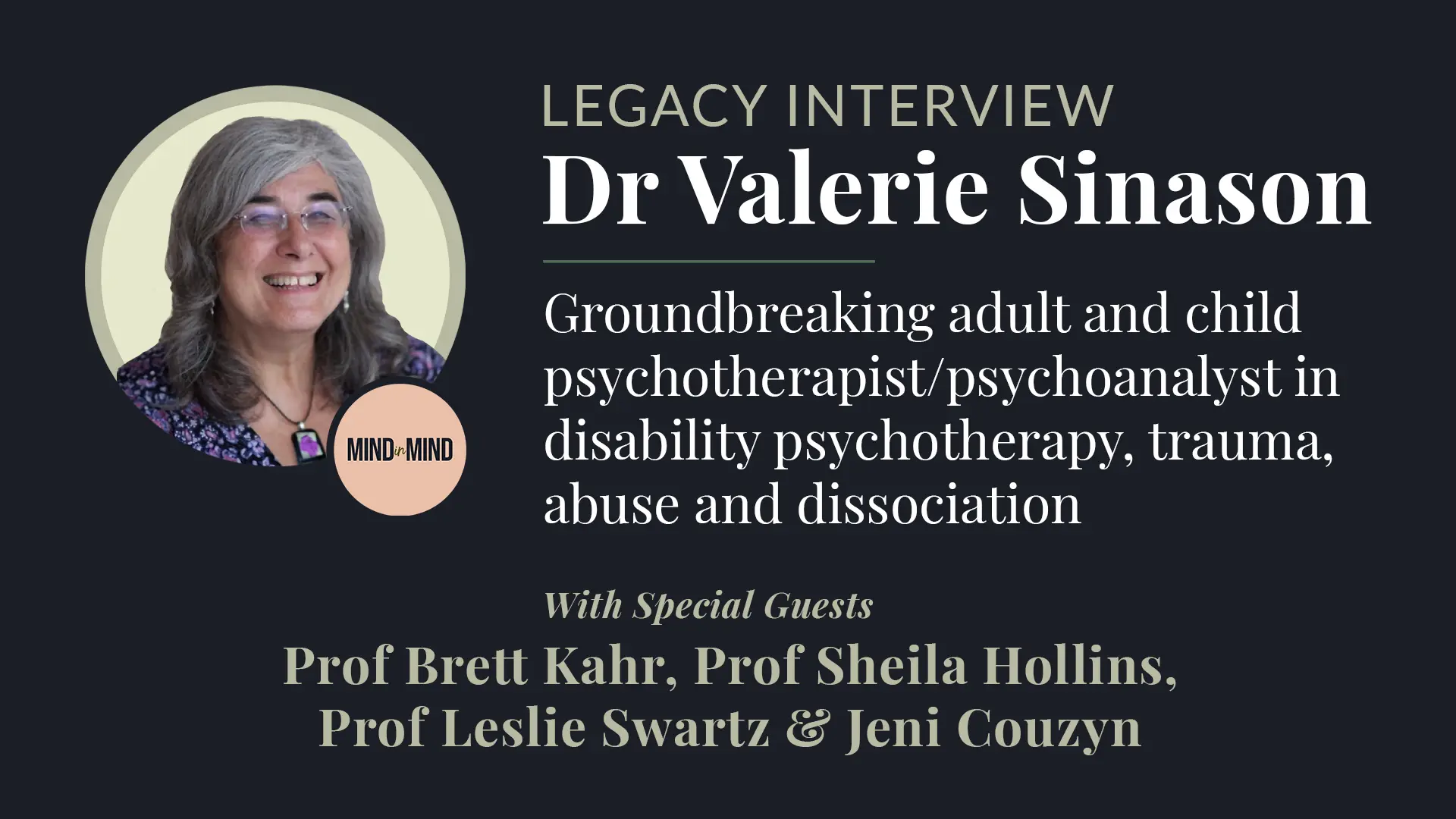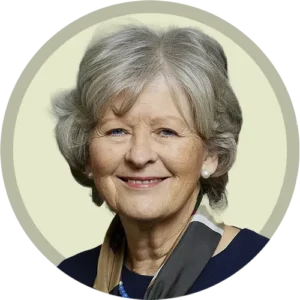
– Watch this recording for £39 includes a 2 hour CEU/CPD certificate –
Dr Valerie Sinason Legacy Interview
Transforming mental health care for people with intellectual disabilities and treating trauma through innovative psychotherapy approaches
With Special Guests
Prof Brett Kahr, Prof Sheila Hollins, Prof Leslie Swartz & Jeni Couzyn
“Thank you so much for hosting such a wonderful tribute to Valerie, and not shying away from the ritual abuse side of her work ❤. As a survivor, this comes from the bottom of my heart. Thank you for giving her and her colleagues voice, it was so beautiful to see how loved she is. Life-affirming.”
Dr Valerie Sinason
This MINDinMIND Legacy Interview features Dr. Valerie Sinason, a pioneering psychotherapist who has made groundbreaking contributions to disability psychotherapy, trauma treatment, and our understanding of dissociative disorders. Valerie’s work has transformed approaches to mental health care for people with intellectual disabilities and brought attention to previously overlooked areas of abuse and trauma.
Valerie Sinason is a poet, writer, child psychotherapist and adult psychoanalyst. She is the founder and former director of the Clinic for Dissociative Studies, and has been a Consultant Psychotherapist at the Tavistock Clinic and St George’s Hospital Medical School. Her work spans decades and has challenged conventional thinking in psychotherapy, often at great personal cost.
Key points from the interview
- The development of psychotherapy approaches for people with intellectual disabilities
- Uncovering and addressing sexual abuse in individuals with disabilities
- Research into ritual abuse and dissociative disorders
- The concept of “secondary handicap” as a defence mechanism
- Integrating psychoanalytic thinking with disability and trauma work
- The importance of bearing witness and giving voice to marginalised populations
- Experiences working in South Africa with traumatised communities
Special Guests:
Professor Brett Kahr
 Brett is a distinguished mental health professional with over four decades of experience, holding senior positions at the Tavistock Institute of Medical Psychology and Regent’s University London. He is also an historian, serving as Honorary Director of Research and Fellow at Freud Museum London. Brett has had a long-standing professional relationship with Valerie, having worked closely with her at the Tavistock Clinic and co-founding the Institute of Psychotherapy and Disability. His expertise in the history of psychoanalysis and psychological trauma provides valuable context to Valerie’s contributions to the field.
Brett is a distinguished mental health professional with over four decades of experience, holding senior positions at the Tavistock Institute of Medical Psychology and Regent’s University London. He is also an historian, serving as Honorary Director of Research and Fellow at Freud Museum London. Brett has had a long-standing professional relationship with Valerie, having worked closely with her at the Tavistock Clinic and co-founding the Institute of Psychotherapy and Disability. His expertise in the history of psychoanalysis and psychological trauma provides valuable context to Valerie’s contributions to the field.
In the interview, Brett discusses:
- Valerie’s place in the history of psychotherapy
- Her courage in confronting difficult topics like abuse and trauma
- The concept of “infanticidal attachment” developed through their collaborative work
Professor Baroness Sheila Hollins
 Sheila is a distinguished psychiatrist, researcher, and policy maker who has made significant contributions to the field of mental health, particularly in the area of intellectual disability. She is an independent crossbench life peer in the House of Lords and Emeritus Professor of Psychiatry of Intellectual Disability at St George’s University of London. Baroness Hollins has been a driving force in advocating for the rights and well-being of individuals with disabilities. Her collaboration with Valerie Sinason has been instrumental in advancing psychotherapy approaches for people with intellectual disabilities.
Sheila is a distinguished psychiatrist, researcher, and policy maker who has made significant contributions to the field of mental health, particularly in the area of intellectual disability. She is an independent crossbench life peer in the House of Lords and Emeritus Professor of Psychiatry of Intellectual Disability at St George’s University of London. Baroness Hollins has been a driving force in advocating for the rights and well-being of individuals with disabilities. Her collaboration with Valerie Sinason has been instrumental in advancing psychotherapy approaches for people with intellectual disabilities.
She shares insights on:
- Her collaboration with Valerie at St. George’s Hospital
- Their pioneering group psychotherapy work
- The development of picture books to aid communication with patient
Professor Leslie Swartz
 Leslie is a clinical psychologist and Professor in the Department of Psychology at Stellenbosch University, South Africa. His work focuses on disability rights and mental health in sub-Saharan Africa, emphasising user participation and partnerships with disability rights organisations. His perspective offers valuable insights into the impact of Valerie’s work in diverse cultural contexts.
Leslie is a clinical psychologist and Professor in the Department of Psychology at Stellenbosch University, South Africa. His work focuses on disability rights and mental health in sub-Saharan Africa, emphasising user participation and partnerships with disability rights organisations. His perspective offers valuable insights into the impact of Valerie’s work in diverse cultural contexts.
He discusses:
- Valerie’s impact on disability and mental health work in South Africa
- Her ability to address difficult topics like privilege and historical violence
- How her approach empowered local practitioners
Jeni Couzyn
 Jeni is an accomplished psychotherapist, feminist poet, and anthologist. She is the Founder Director of the Bethesda Foundation and The Bushmen Heritage Museum in South Africa, where local Bushmen have been creating artwork as part of ongoing work to deal with intergenerational violence and trauma. Jeni’s unique perspective combines her creative background with her psychotherapeutic work, offering insights into the application of Valerie’s approaches in community-based settings.
Jeni is an accomplished psychotherapist, feminist poet, and anthologist. She is the Founder Director of the Bethesda Foundation and The Bushmen Heritage Museum in South Africa, where local Bushmen have been creating artwork as part of ongoing work to deal with intergenerational violence and trauma. Jeni’s unique perspective combines her creative background with her psychotherapeutic work, offering insights into the application of Valerie’s approaches in community-based settings.
She shares:
- How Valerie’s workshops transformed approaches to addressing abuse in marginalised communities
- The impact of Valerie’s work on intergenerational trauma healing
- The role of art and creativity in trauma treatment inspired by Valerie’s methods
More about Valerie
Dr Valerie Sinason’s career spans decades, marked by her pioneering work in disability psychotherapy, trauma treatment, and the study of dissociative disorders. Born in London in 1946, Valerie’s early life experiences, including growing up with a grandmother who had an intellectual disability, laid the foundation for her future work.
Valerie’s academic journey took her from studying English literature at Goldsmiths College to child psychotherapy training at the Tavistock Clinic. It was at the Tavistock that she began to challenge traditional views on disability and psychotherapy, particularly through her work with the Mental Handicap Workshop.
Her groundbreaking research in the late 1980s led her to uncover the prevalence of abuse among individuals with disabilities and those with dissociative disorders. This work, while controversial at times, opened up new avenues for understanding and treating trauma in vulnerable populations.
Valerie’s approach integrates psychoanalytic thinking with disability studies and trauma work. She emphasises the importance of “bearing witness” and giving voice to those who have been marginalised or silenced. Her concept of “secondary handicap” as a defence mechanism has been influential in understanding the psychological processes of individuals with disabilities.
Throughout her career, Valerie has worn many hats – child psychotherapist, psychoanalyst, researcher, author, and poet. Her prolific writing spans academic papers, books, and poetry collections. In 2022, she added novelist to her repertoire with a work that explores the sensitive topic of VIP abuse rings.
Valerie founded the Clinic for Dissociative Studies in 1998, providing a space for specialised treatment and research. Her work has taken her beyond the UK, including significant contributions in South Africa, where she has worked with traumatised black communities and people with disabilities.
Despite facing criticism and challenges, Valerie’s determination to advocate for the most vulnerable has earned her widespread respect. Her contributions were recognized in 2016 when she received the Lifetime Achievement Award from the International Society for the Study of Trauma and Dissociation.
Even in her so-called retirement, Valerie continues to push boundaries and contribute to the field, embodying her belief that giving voice to the powerless is a lifelong commitment.
Key Quotes
“People feel it’s their own fault that they’ve been hurt. And because of that, they feel terrible shame. And they keep it secret.” – Valerie Sinason on addressing abuse
“We are all free to notice when you work with a subject that doesn’t have a whole load of people loving it.” – Valerie Sinason on pioneering new areas of study
Interviewer
Valerie is in conversation with Jane O’Rourke.
Jane O'Rourke, founder of MINDinMIND and a former award-winning BBC journalist now practising as a Child and Adolescent Psychotherapist, draws upon her combined expertise to create rich and thoughtful conversations with leading mental health clinicians. Her interviews weave together the personal and professional threads of her guests' journeys, capturing the experiences that have shaped their clinical work and thinking.
Details correct at time of recording on 16 July 2024
Bibliography & Resources
Books:
Sinason, V. (2022). The Orpheus Project. London: Sphinx.
Sachs, A., & Sinason, V. (Eds.) (2023). The Psychotherapist and the Professional Complaint. London: Karnac.
Sinason, V., & Potgieter, R. (Eds.) (2021). Treating Children with Dissociative Disorders: Attachment Trauma Theory and Practice. London: Routledge.
Sinason, V. (2020). The Truth About Trauma and Dissociation. London: Confer Books.
Sinason, V. (2010). Mental Handicap and the Human Condition: An Analytic Approach to Intellectual Disability (2nd revised edition). London: Free Association Books.
Sinason, V. (Ed.) (1994). Treating Survivors of Satanist Abuse. London: Routledge.
Sinason, V. (1992). Mental Handicap and the Human Condition: New Approaches from the Tavistock Clinic. London: Free Association Books.
Sinason, V. (1987). Inkstains & Stilletos. West Kirby: Headland Publications.
Journal Articles:
Sinason, V. (1986). Secondary mental handicap and its relationship to trauma. Psychoanalytic Psychotherapy, 2(2), 131-154.
Sinason, V. (1988). Smiling, swallowing, sickening and stupefying: The effect of sexual abuse on the child. Psychoanalytic Psychotherapy, 3(2), 97-111.
Sinason, V. (1988). Dolls and bears: From symbolic equation to symbol. The significance of different play material for sexually abused children and others. British Journal of Psychotherapy, 4(4), 349-363.
Sinason, V. (1988). Richard III, Hephaestus and Echo: Sexuality and mental/multiple handicap. Journal of Child Psychotherapy, 14(2), 93-105.
Sinason, V. (1990). Passionate lethal attachments. British Journal of Psychotherapy, 7(1), 66-76.
Sinason, V. (1996). From abused to abuser. In C. Cordess & M. Cox (Eds.), Forensic Psychotherapy: Crime, Psychodynamics and the Offender Patient. Vol. 2: Mainly Practice (pp. 371-382). London: Jessica Kingsley Publishers.
Sinason, V. (2000). Psychotherapy, learning disabilities and trauma: New perspectives. British Journal of Psychiatry, 176, 32-36. (with S. Hollins)
Sinason, V. (2006). No touch please—we’re British psychodynamic practitioners. In G. Galton (Ed.), Touch Papers: Dialogues on Touch in the Psychoanalytic Space (pp. 49-60). London: Karnac.
Sinason, V. (2008). From social conditioning to mind control. In A. Sachs & G. Galton (Eds.), Forensic Aspects of Dissociative Identity Disorder (pp. 167-184). London: Karnac.
Sinason, V. (2017). Dying for love: An attachment problem with some perpetrator introjects. Journal of Trauma & Dissociation, 18(3), 340-355.
Sinason, V. (2022). Being a ‘barefoot therapist’ in a time of war: Offering support to traumatised and tortured children and adults. Psychotherapy and Politics International, 20(4), 1-15.

